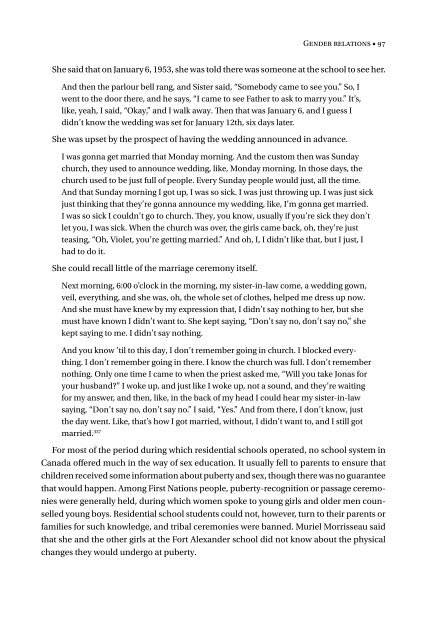The Survivors Speak
1MB8J05
1MB8J05
Create successful ePaper yourself
Turn your PDF publications into a flip-book with our unique Google optimized e-Paper software.
Gender relations • 97<br />
She said that on January 6, 1953, she was told there was someone at the school to see her.<br />
And then the parlour bell rang, and Sister said, “Somebody came to see you.” So, I<br />
went to the door there, and he says, “I came to see Father to ask to marry you.” It’s,<br />
like, yeah, I said, “Okay,” and I walk away. <strong>The</strong>n that was January 6, and I guess I<br />
didn’t know the wedding was set for January 12th, six days later.<br />
She was upset by the prospect of having the wedding announced in advance.<br />
I was gonna get married that Monday morning. And the custom then was Sunday<br />
church, they used to announce wedding, like, Monday morning. In those days, the<br />
church used to be just full of people. Every Sunday people would just, all the time.<br />
And that Sunday morning I got up, I was so sick. I was just throwing up. I was just sick<br />
just thinking that they’re gonna announce my wedding, like, I’m gonna get married.<br />
I was so sick I couldn’t go to church. <strong>The</strong>y, you know, usually if you’re sick they don’t<br />
let you, I was sick. When the church was over, the girls came back, oh, they’re just<br />
teasing, “Oh, Violet, you’re getting married.” And oh, I, I didn’t like that, but I just, I<br />
had to do it.<br />
She could recall little of the marriage ceremony itself.<br />
Next morning, 6:00 o’clock in the morning, my sister-in-law come, a wedding gown,<br />
veil, everything, and she was, oh, the whole set of clothes, helped me dress up now.<br />
And she must have knew by my expression that, I didn’t say nothing to her, but she<br />
must have known I didn’t want to. She kept saying, “Don’t say no, don’t say no,” she<br />
kept saying to me. I didn’t say nothing.<br />
And you know ’til to this day, I don’t remember going in church. I blocked everything.<br />
I don’t remember going in there. I know the church was full. I don’t remember<br />
nothing. Only one time I came to when the priest asked me, “Will you take Jonas for<br />
your husband?” I woke up, and just like I woke up, not a sound, and they’re waiting<br />
for my answer, and then, like, in the back of my head I could hear my sister-in-law<br />
saying, “Don’t say no, don’t say no.” I said, “Yes.” And from there, I don’t know, just<br />
the day went. Like, that’s how I got married, without, I didn’t want to, and I still got<br />
married. 337<br />
For most of the period during which residential schools operated, no school system in<br />
Canada offered much in the way of sex education. It usually fell to parents to ensure that<br />
children received some information about puberty and sex, though there was no guarantee<br />
that would happen. Among First Nations people, puberty-recognition or passage ceremonies<br />
were generally held, during which women spoke to young girls and older men counselled<br />
young boys. Residential school students could not, however, turn to their parents or<br />
families for such knowledge, and tribal ceremonies were banned. Muriel Morrisseau said<br />
that she and the other girls at the Fort Alexander school did not know about the physical<br />
changes they would undergo at puberty.


